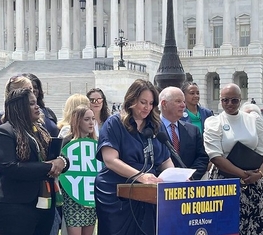Schroeder v. Minnesota Secretary of State
Case Summary
LWV Minnesota filed an amicus brief in the Minnesota Supreme Court supporting four plaintiffs seeking to overturn Minnesota’s restrictions on voting by people with felony convictions. Minnesota law bans anyone convicted of a felony from voting until they complete all parts of their sentence, including probation, supervised release, and/or parole.
Minnesota bans citizens convicted of felonies from voting until they complete their entire sentence. This requirement, first enacted in 1857, mandates that a person must complete all parts of their sentence, including probation, supervised release or parole before their voting rights are restored, even when they have already completed serving time in prison.
On October 21, 2019, four Minnesotans filed a lawsuit in the Ramsay County District Court, arguing this ban violated the state Constitution’s guarantees of equal protection, due process, and the right to vote. The plaintiffs had previously been convicted of felonies, served time in prison, and were on probation or other forms of supervised release. Jennifer Schroeder, the named plaintiff, was sentenced to one year in jail on drug possession charges and released in 2014. Her sentence included forty years of probation, meaning she was effectively banned from voting until 2053. Another plaintiff, Christopher James Jecevicus-Varner, was convicted in 2009 of drug possession-related charges, and banned from voting until 2034, as his sentence included 20 years of probation. At the time of filing, almost 53,000 Minnesotans could not vote because of a past felony conviction.
On August 11, 2020, the court granted summary judgment to the defendants, dismissing the case. The court ruled that Minnesota’s Constitution did not protect a fundamental right to vote for citizens with felony convictions. Therefore, the plaintiffs’ equal protection and due process claims would fail, as the current requirement to complete a full sentence was a rational means for the legislature to promote rehabilitation of those convicted of felonies. On appeal, the Minnesota Court of Appeals upheld the trial court’s ruling. Plaintiffs requested review by the Minnesota Supreme Court, which was granted on August 10, 2021.
On September 15, 2021, the League of Women Voters of Minnesota, Common Cause Minnesota, and the Minnesota Second Chance Coalition filed an amicus brief supporting the plaintiffs. The brief argued the challenged ban was overbroad and expanded the definition of felonies, defined as crimes punishable by one year or more of imprisonment, far beyond what the framers of the Minnesota Constitution envisioned when the ban on voting by citizens with felony convictions was enacted. The brief also asserted that, because voting was a fundamental right, limits upon it could only be authorized by a constitutional amendment, meaning the legislature could not validly enact such restrictions.
On January 4, 2023, legislation was introduced in the Minnesota House of Representatives repealing the ban. If enacted, the bill would allow any citizen not currently incarcerated to vote. On February 22, 2023, the Minnesota Senate passed the bill, sending it to Governor Tim Walz for his signature.
The League was represented in this matter by Stoel Rives LLP.
LWV Timeline
Plaintiffs file complaint
Four Minnesotans on supervised release who were previously convicted of felonies and banned from voting file a lawsuit in the District Court in Ramsay County, Minnesota, arguing their disenfranchisement violated the state Constitution.
Court grants summary judgment to defendants
The trial court rules the ban on voting did not violate the Minnesota Constitution’s equal protection and due process clauses under rational basis review.
Minnesota Supreme Court grants petition for review
LWV of Minnesota files amicus brief
LWV of Minnesota, Common Cause Minnesota, and the Minnesota Second Chance Coalition file an amicus brief arguing that the voting ban is overbroad and that the legislature had no right to limit the franchise without authorization from a state constitutional amendment.
Minnesota Supreme Court upholds disenfranchisement law
The Minnesota Supreme Court issues an opinion finding the disenfranchisement law does not violate the Minnesota Constitution’s guarantees of equal protection and the fundamental right to vote. The opinion suggests the Minnesota Legislature is the proper forum to address the issue of returning citizen disenfranchisement.
Minnesota legislature passes law allowing returning citizens to vote
The Minnesota legislature passes HF28, which allows any citizen convicted with a felony to vote upon release from prison, or to vote after conviction, if their sentence does not include incarceration. The bill also includes provisions to ensure those eligible are notified by the Minnesota Secretary of State or prison officials of their right to vote.
Governor Tim Walz signs bill into law
Governor Tim Walz signs HF 28. The law's provisions will take effect on July 1, 2023.





